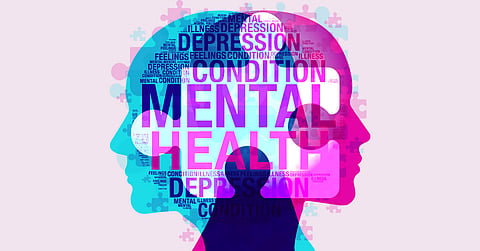
- Home
- Live Blog
- Breaking News
- Top Headlines
- Cities
- NE News
- Sentinel Media
- Sports
- Education
- Jobs

Heramba Nath
(herambanath504@gmail.com)
Mental health is an essential aspect of overall well-being, influencing thoughts, emotions, and actions in daily life. It determines how individuals cope with stress, relate to others, and make decisions. Good mental health allows people to handle challenges effectively, maintain fulfilling relationships, and work productively.
A stable mental state contributes to physical health, as stress and anxiety can lead to ailments such as high blood pressure, heart disease, and weakened immune function. Emotional resilience helps individuals adapt to changes and recover from adversities, fostering personal growth and a positive outlook on life. Prioritising mental well-being reduces the risk of developing mental illnesses such as depression and anxiety disorders.
Social interactions play a significant role in maintaining mental health. Strong support systems comprising family, friends, and community provide a sense of belonging and security. Open communication and seeking help when needed prevent feelings of isolation and loneliness, which are common contributors to declining mental health. Community-based programmes, peer support groups, and digital platforms have become valuable resources in ensuring that mental health support is accessible to all.
Workplace environments also impact mental health. Supportive workplaces that promote work-life balance and employee well-being result in increased productivity and job satisfaction. Addressing stressors, maintaining manageable workloads, and fostering a culture of inclusivity and support contribute to a mentally healthy workforce. Organisations should prioritise mental health initiatives, such as stress management workshops, flexible work arrangements, and access to counselling services, to create a positive and nurturing work atmosphere.
Engaging in physical activities, practicing mindfulness, and maintaining a balanced diet are crucial for mental wellness. Regular exercise releases endorphins, which improve mood and reduce stress levels. Mindfulness techniques such as meditation and deep breathing promote relaxation and emotional regulation, enhancing mental clarity and focus. A nutritious diet rich in essential vitamins and minerals supports brain function and emotional stability. Adequate sleep and relaxation are equally vital in maintaining cognitive function and overall emotional balance.
Raising awareness about mental health is vital to breaking the stigma associated with mental illnesses. Encouraging open discussions and educating communities help individuals recognise the importance of seeking professional support when necessary. Mental health services, including therapy and counselling, provide valuable guidance and coping mechanisms for those struggling with emotional distress. Public policies should ensure that mental health services are affordable and widely available, reducing barriers to access.
Preventive measures such as stress management techniques, self-care routines, and healthy lifestyle choices contribute to long-term mental well-being. Recognising early signs of distress and addressing them proactively reduces the likelihood of severe mental health conditions developing. Schools and educational institutions should incorporate mental health education into their curricula to equip students with the knowledge and skills to maintain psychological well-being from an early age.
Mental health should be treated with the same urgency as physical health. Societies must prioritise accessible mental health care, implement policies that support mental well-being, and create environments that foster emotional resilience. Everyone has a role in promoting mental health awareness and ensuring that individuals receive the necessary support to lead fulfilling and balanced lives. Governments, healthcare professionals, non-governmental organizations, and individuals must work collaboratively to remove barriers and create a society that values and prioritises mental health.
In addition to professional intervention, self-care practices play a crucial role in maintaining mental well-being. Activities such as engaging in hobbies, journaling, connecting with nature, and practicing gratitude can significantly enhance emotional health. Self-reflection allows individuals to gain a deeper understanding of their emotions and triggers, enabling them to develop effective coping strategies.
The intersection of mental health and technology has led to the rise of digital mental health solutions, including mobile apps, online therapy, and virtual support communities. These advancements have made mental health care more accessible and convenient, particularly for individuals who may face geographical or financial constraints. However, it is essential to ensure that technology is used responsibly and that digital interventions maintain ethical standards and evidence-based approaches.
Cultural perceptions of mental health influence how individuals seek help and perceive psychological challenges. Some societies still associate mental illness with weakness, which can deter individuals from seeking necessary support. Addressing cultural stigmas through education and advocacy can create a more inclusive and supportive environment for those struggling with mental health issues.
Mental health and economic productivity are closely linked. Poor mental health can result in absenteeism, reduced work performance, and increased healthcare costs. Investing in mental health not only enhances individual well-being but also contributes to the economic growth of a nation. Policymakers must recognise the economic burden of untreated mental illnesses and allocate adequate resources to mental health care systems.
Promoting mental health in vulnerable populations, such as refugees, low-income communities, and individuals with disabilities, requires targeted interventions and support services. Societal inequalities, discrimination, and lack of access to resources exacerbate mental health challenges in these groups. Governments and organizations should prioritise mental health equity by implementing inclusive policies and expanding outreach programmes.
Crisis intervention and emergency mental health support are crucial in preventing severe consequences such as suicide and self-harm. Helplines, crisis centres, and emergency psychiatric services must be readily available to provide immediate assistance to those in distress. Public awareness campaigns should emphasise the importance of seeking help during mental health emergencies.
Ultimately, mental health is a fundamental human right. Every individual deserves access to quality mental health care, supportive communities, and the opportunity to thrive emotionally and psychologically. By fostering a culture of empathy, understand-ing, and proactive mental health management, societies can create healthier and more resilient communities for future generations.